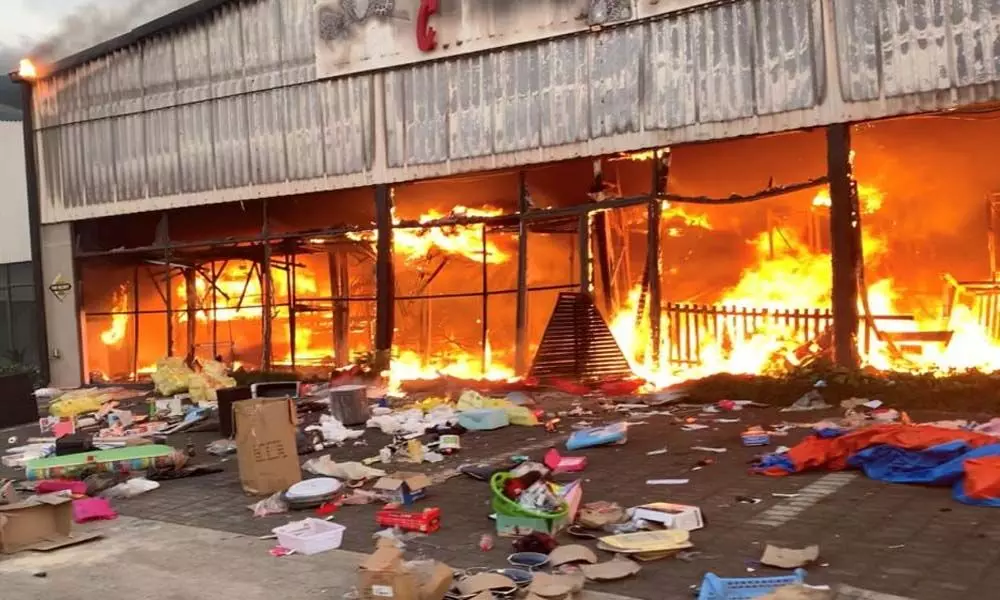Live
- Jacqueline dazzles at Da-Bangg Reloaded concert
- Time to boost measures to prevent drowning, save children: WHO
- TDP achieves milestone with 73 lakhs membership registration, says Chandrababu
- South Korea: Main Oppn hails Yoon's impeachment motion passage as 'victory for people, democracy'
- RG Kar issue: Tension flared over parallel protests by Congress, SUCI(C) outside CBI offices
- After furore, Central Railway revokes order to raze Lord Hanuman Temple at Dadar
- Now hoteliers' body in Bengal's Alipurduar shut doors for Bangladeshi tourists
- District Collector Encourages Students to Utilize Government Facilities for a Better Future
- Per capita availability of fruits, vegetables increases in India
- FII buying reaches Rs 22,765 crore in Dec as economic growth stays resilient
Just In
Food Shortage Set to Grip South Africa After Rioters Rampage


South Africa riots over jailing of ex-leader Zuma
South Africans are expected to face major food shortages in the wake of days of violent unrest across two key provinces, as rioters upend supply chains by looting supermarkets and torching goods trucks.
South Africans are expected to face major food shortages in the wake of days of violent unrest across two key provinces, as rioters upend supply chains by looting supermarkets and torching goods trucks.
Footage of empty or sparse grocery-store shelves has been a staple of local news reports since the weekend, while chains such as Shoprite Holdings Ltd. and Pick n Pay Stores Ltd. closed many outlets altogether. In parts of Durban, the coastal KwaZulu-Natal city at the center of the upheaval, long queues formed outside the few open food shops and basics such as bread and milk were in short supply.
"Food is going to be a problem because shops haven't been open for three days and many with bulk storage have been looted," said Gavin Hudson, chief executive officer of sugar producer Tongaat Hulett Ltd., which has suspended milling and refining operations outside the city. "We are going to face some food issues in KwaZulu-Natal very shortly."
The unrest started as protests against the arrest of former President Food Shortage, but soon degenerated into deadly and destructive rampages in KwaZulu-Natal and Gauteng, the economic hub. Rioters pilfered food, electronic goods and medical supplies from at least 800 stores, and retailers have lost an estimated 5 billion rand ($340 million) to date, according to the Consumer Goods Council of South Africa. Beer depots and liquor stores, already unable to operate due to a ban to contain the pandemic, have also been a target.
Trucks Destroyed
More than 35 trucks have been destroyed, with a cost to logistics firms of at least 300 million rand and counting, the Road Freight Association estimates. That's led to the closing of a key highway between Durban and Johannesburg, cutting off the flow of food and other essential goods from the country's biggest port to its most populous city.
Citrus farmers are in mid-export season and are among those unable to harvest and transport their produce, Christo van der Rheede, executive director of AgriSA, said in an interview. Sugarcane fields have been razed and livestock stolen, and commitments on exports that bring in crucial foreign exchange and support jobs may not be met, he said.
Kwanalu, the KwaZulu-Natal agricultural union, estimates the losses for the provincial farming community to be in the hundreds of millions of rands.
"South Africans are very fortunate to receive fresh fruit, fresh meat, fresh vegetables on a daily basis," Van der Rheede said. "If these supply chains are disrupted, there won't be fresh produce in stores and people will have to rely on frozen supplies. But what do we do if we run out of that as well?"
The food crisis is developing more than 18 months into a coronavirus pandemic that's led to a spike in hunger around the world. As many as 811 million people -- about a 10th of the global population -- were undernourished in 2020, the United Nations said in a report on Monday.
Meanwhile, international prices are close to their 2011 peak and still rising, with South Africa just outside the top 20 nations most vulnerable to food-related violence, Ziad Daoud and Felipe Hernandez of Bloomberg Economics said in a July 12 note. Food inflation in the country hit 6.8% in May, the fastest pace in almost five years.
While the crisis may have its roots in support for Zuma, the scale of the outbreak has also been linked to years of poor government services and a record unemployment rate of 32.6%. South Africa is one of the most unequal countries in the world, underlying a high crime rate, and President Cyril Ramaphosa on Monday described the violence as "opportunistic acts of criminality, with groups of people instigating chaos merely as a cover for looting and theft."
A small blessing is that the riots are localized in two specific provinces, but the problem will escalate if the violence spreads, said Van der Rheede. If that happens, the country's entire food logistics network would be jeopardized.
"The last thing that we want is for South Africans to experience hunger, food shortages and starvation," he said.

© 2024 Hyderabad Media House Limited/The Hans India. All rights reserved. Powered by hocalwire.com






